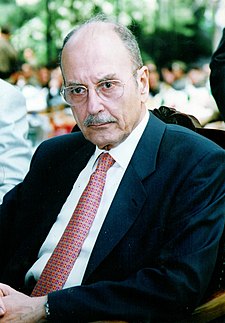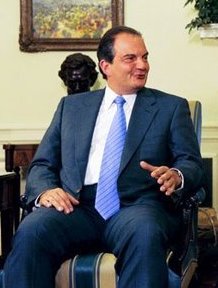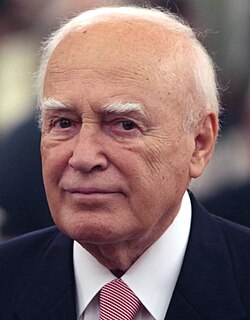| |||||||||||||||||||||||||||
| |||||||||||||||||||||||||||
| |||||||||||||||||||||||||||
 |
|---|
| This article is part of a series on the politics and government of Greece |
An indirect election for the position of President of the Hellenic Republic was held by the Hellenic Parliament in April–May 1980.

The Hellenic Parliament is the parliament of Greece, located in the Old Royal Palace, overlooking Syntagma Square in Athens. The Parliament is the supreme democratic institution that represents the citizens through an elected body of Members of Parliament (MPs).
The ruling New Democracy under Prime Minister Konstantinos Karamanlis possessed only 175 votes in the 300-strong parliament, falling short of the required number for a straightaway election (200 votes in the first two rounds, 180 in the third). [1] Karamanlis, who was aware of PASOK's electoral upswing and the imminence of its coming to power—as indeed happened in the 1981 elections—preferred to move to the presidency of the Republic, which at the time still held considerable powers. [2] He therefore resigned as Prime Minister to stand for the presidency, being succeeded as Prime Minister by Georgios Rallis.

The New Democracy, also referred to as ND (ΝΔ) by its initials, is a liberal-conservative political party in Greece. In modern Greek politics, New Democracy has been the main centre-right political party and one of the two major parties along with its historic rival, the Panhellenic Socialist Movement (PASOK). Having spent two and a half years in government under the presidency of Antonis Samaras, New Democracy lost its majority in the Hellenic Parliament and became the major opposition party after the January 2015 legislative election.

Konstantinos G. Karamanlis, commonly anglicised to Constantine Karamanlis or just Caramanlis, was a four-time Prime Minister and twice President of the Third Hellenic Republic, and a towering figure of Greek politics whose political career spanned much of the latter half of the 20th century.
Several candidates were put forward by minor parties alongside Karamanlis, including Georgios Mylonas (KODISO), Leonidas Kyrkos (KKE Interior), Ioannis Zigdis (EDIK), Stelios Papathemelis, Ilias Iliou and Faidon Vegleris (United Democratic Left). [1] Karamanlis received 179 votes and 180 votes in the first and second ballot respectively, [2] and was elected on the third ballot with 183 votes, i.e. the 175 MPs of New Democracy as well as eight independent MPs or MPs from the minor parties. [1]
Georgios Mylonas was a Greek Center Union and New Democracy politician and government minister. He was a close aide to Greek statesman and premier George Papandreou, and was repeatedly elected deputy for the Ioannina seat with the Center Union. Mylonas had served as an undersecretary to the premier's office and education undersecretary from 1963 to 1965. He assumed the transport ministry in the first post-junta government in 1974 and was Minister for Culture from 1989 to 1990. Mylonas was the author of the book Escape From Amorgos, detailing his escape from the island, where he was exiled during the 1967-74 military dictatorship.

Leonidas Kyrkos was a Greek leftist politician and member of the Hellenic Parliament and the European Parliament.

Stelios Papathemelis is a Greek politician and lawyer. He studied law at the Aristotle University of Thessaloniki.












